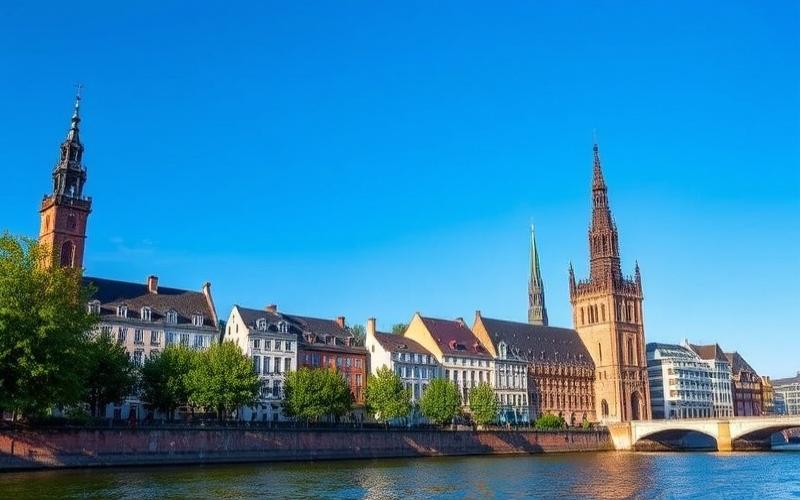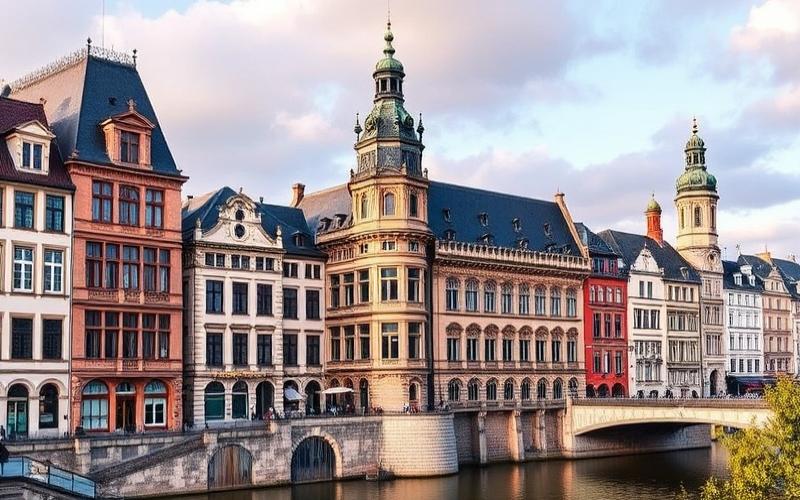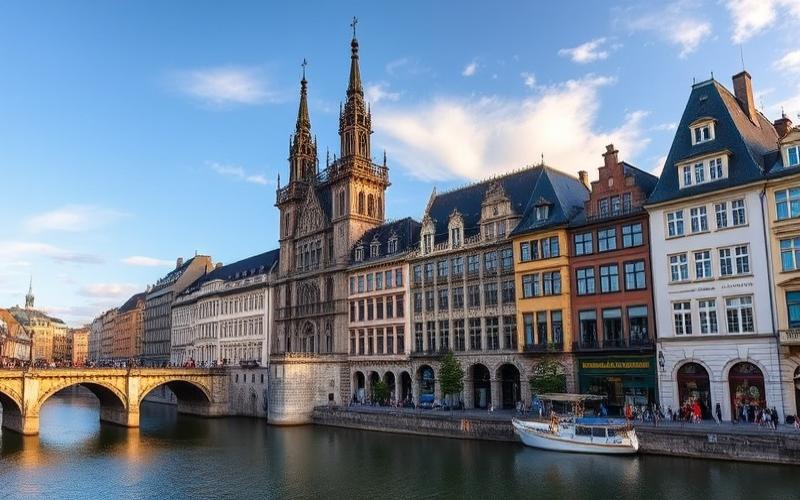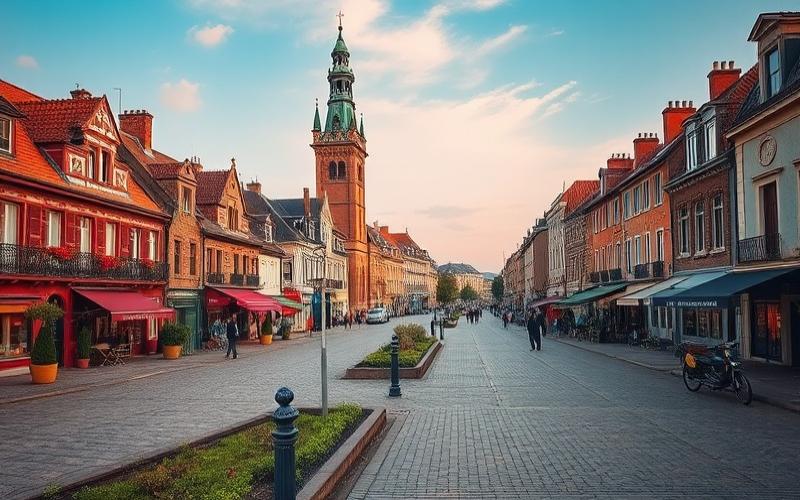
 Published on and written by Cyril Jarnias
Published on and written by Cyril Jarnias
The Impact of Geopolitical Situation on Luxembourg Real Estate
The current geopolitical situation has significant and unexpected repercussions on the real estate sector in Luxembourg, particularly due to the war in Ukraine. Although geographically distant from the conflict, this small country feels the impact through complex economic and financial movements that influence the local market.
Investors, as well as buyers, are repositioning themselves as economic uncertainty sets in, affecting prices and real estate demand. Thus, understanding these dynamics is essential to anticipate the evolution of the Luxembourg market and strategically decide on investment opportunities in these uncertain times.
Good to Know:
As an international financial hub, Luxembourg is particularly sensitive to global geopolitical and economic fluctuations.
Geopolitical Consequences on the Luxembourg Real Estate Market
The war in Ukraine has caused major disruptions in the European economy, directly and indirectly impacting the Luxembourg real estate market. Rising energy and construction material costs, financial volatility, and geopolitical uncertainties have contributed to pressure on Luxembourg’s economic growth and its real estate sector.
Direct Economic Consequences:
- Increase in construction costs linked to imported inflation (energy, raw materials).
- Slowdown in Luxembourg’s economic growth while maintaining low unemployment.
- Rise in interest rates by the ECB in response to high inflation; limiting real estate purchasing power.
| Factor | Direct Impact on Luxembourg | Real Estate Consequence |
|---|---|---|
| Energy Cost | General increase | Price increase |
| ECB Rates | Increase then gradual easing (2024/25) | Credit access hindered then revived |
| Inflation | Pressure on households & businesses | Increased caution among buyers |
Migration Flows & Capital Influx:
The Ukrainian conflict generates a migratory influx towards safe European countries. Luxembourg already hosts a significant foreign population and could see this trend grow.
As a financial safe haven, the Grand Duchy traditionally attracts capital during periods of international uncertainty. Investors seek to secure their assets in a stable environment.
Possible effects:
- Increased demand for certain types of housing (short-term rentals or premium).
- Temporary price increase in sought-after segments.
European Economic and Monetary Policies:
The ECB raised its rates to counter post-pandemic and Ukrainian war inflation; since 2024, it has initiated a more accommodating monetary policy with a gradual decrease in rates.
Expected impacts:
- Timid but real recovery of the real estate market by late 2024/early 2025 due to more accessible credit.
List of observed effects:
- Stabilization then slight recovery of real estate transactions
- Temporary decline or stagnation, even slight price drop during peak uncertainty
- Gradual revival supported by national fiscal measures
Recent Evolution (Early 2025):
| Property Type | Price Evolution Q1 2025 |
|---|---|
| Existing Homes | +3.5% |
| Existing Apartments | Stable (+0.1%) |
| New Apartments | Slight recovery (+1.2%) |
Regional disparities persist: marked increase in east/center/south for existing homes; stability or slight decrease elsewhere for some apartments.
Luxembourg-Russia/Ukraine Economic Relations:
The Luxembourg financial sector is exposed to sanctions against Russia via investment funds or banks historically managing Russian assets. Restrictions limit these financial flows:
List of indirect impacts:
- Potential loss of Russian investors
- Possible reduction in cross-border volume related to companies based in Luxembourg
The conflict also disrupts certain logistical chains linking the Grand Duchy to Ukrainian/Russian markets via industrial import/export.
In summary, these combined elements depict a local market marked by volatility: after a downturn phase linked to inflationary shock/geopolitical tensions—stabilization then gradual rebound driven by more flexible monetary policies and national fiscal adaptation.
Good to Know:
The war in Ukraine has repercussions on the Luxembourg real estate market, influenced by migration flows and an influx of capital seeking a safe haven. Geopolitical tensions push some investors to transfer their assets to stable areas like Luxembourg, potentially stimulating real estate demand and raising prices in certain regions. Meanwhile, economic sanctions and tensions with Russia could disrupt commercial relations between Luxembourg and these countries, indirectly impacting the real estate sector. Adjustments in European Union economic and monetary policies related to this crisis could influence interest rates, making real estate financing more or less accessible, which would affect housing supply and demand. Finally, any deterioration in economic ties with Russia could alter certain trade flows, redirecting attention towards safer markets, but also introducing uncertainties that require continuous monitoring.
Impact of the Ukrainian Crisis on Real Estate Investment in Luxembourg
The Ukrainian crisis has caused geopolitical instability that has impacted real estate investment decisions in Luxembourg. Investors perceived an increase in risk, particularly due to financial market volatility and sharply rising energy costs linked to the conflict.
- Effects on Risk Perception:
- Uncertainty related to the war has made investors more cautious, with some preferring to wait or diversify their portfolio.
- Real estate remains considered a safe-haven asset, but the context generated a temporary slowdown in transactions and a decrease in confidence in the local market.
| Year | Transaction Volume | Real Estate Price Variation | ECB Interest Rate |
|---|---|---|---|
| 2022 | Sharp decline | Beginning of downturn | Sharp increase |
| 2023 | Marked decline | Confirmed decrease | Maintained high |
| 2024 | Slow stabilization | Slowing decline | First easing |
| 2025 (forecasts) | Expected rebound | Stable or slight price increase | New decrease expected |
- Real Estate Market Reaction:
- After ten years of sustained growth, the Luxembourg market experienced a sharp turnaround in 2023 with a collapse in volumes and, for the first time in a long while, a real price decline.
- The energy crisis triggered by the war in Ukraine increased costs for developers and property owners.
- In response to this situation, the Luxembourg government extended or strengthened several fiscal measures aimed at supporting buyers and sellers.
- Foreign Investment Flows:
- Incoming flows contracted during the peak of uncertainty (2022-23), but a gradual recovery has been observed since early 2024 with European monetary easing.
- Luxembourg remains attractive due to its institutional stability; however, some foreign funds preferred to wait or moved their capital to other destinations perceived as less exposed to indirect risks from the conflict.
Significant Changes Observed:
- Temporary decrease then stabilization or even gradual price recovery by the end of the period
- Net slowdown in new construction due to energy overcosts
- Occasional increase in vacant housing facing temporary demand withdrawal
- Political and Regulatory Impact:
- The Luxembourg government adapted its fiscal policy to encourage homeownership (extension of tax credits).
- Specific measures now aim to promote sustainable investment to limit exposure to external shocks, particularly related to energy costs.
Concrete Examples & Sector Adaptation:
- Several major local developers accelerated their transition to low-energy construction, integrating more green technologies to mitigate their dependence on fossil fuels.
- Growing adoption by local real estate agencies of innovative digital tools to facilitate virtual tours and automated property management in a context where international travel was reduced.
- Typical case: residential projects integrating solar panels & home automation systems launched from mid‑2024 in several peripheral neighborhoods—dual strategy: meet increased need for energy resilience while offering international investors concrete environmental added value.
Main Post-Crisis Trends:
- Increased search by foreign institutional investors (German, Swiss funds) for secure “core” assets
- Pressure on the affordable rental segment; continuous rise in ESG requirements in each new transaction
This sequence illustrates how a major geopolitical crisis can not only cause an immediate shock but also catalyze structural innovations and lasting strategic adaptations among all players in the Luxembourg real estate sector.
Good to Know:
The Ukrainian crisis intensified risk perception among real estate investors in Luxembourg, leading to increased caution and a slight decrease in foreign investments; however, the market quickly showed signs of resilience. Geopolitical tensions led investors to pay closer attention to political stability, but Luxembourg’s economic strength attracted those seeking a safe haven, which stabilized real estate prices. The government strengthened its policy of attracting secure investments, notably by facilitating portfolio diversification processes, which paved the way for innovation in the sector, such as integrating digital solutions to improve real estate management efficiency. Recent examples, like the increase in co-living and eco-friendly housing projects, illustrate the market’s adaptation to new economic and social realities induced by the crisis.
Welcoming Refugees: Challenges and Opportunities in Luxembourg’s Housing Sector
Main Challenges for Refugee Housing in Luxembourg
Luxembourg faces two major obstacles in welcoming and housing refugees:
- Shortage of available housing: The housing market is saturated, with reception capacity largely exceeded by demand. For example, 31% of the 7,300 people housed are recognized refugees struggling to leave collective structures due to lack of solutions in the private market.
- High real estate costs and unaffordable rents: Very high prices severely limit access to the rental market, even for households with stable employment or receiving public assistance.
| Indicator | Value / Situation |
| Total ONA accommodation capacity | 7,300 places |
| Share occupied by recognized refugees | 31 % |
| Arrivals in ONA network (2024) | 2,790 people |
| Departures from ONA network (2024) | 2,148 people |
Government Initiatives
- Ongoing reforms on real estate taxation and administrative simplification to stabilize prices and increase available housing stock.
- Lease reform project with stated objective of rent caps.
- Tax in preparation on mobilization of unused land and housing, to encourage construction or return to rental market.
- Creation of structures like the “Return House” to support those whose applications were denied, while freeing up necessary places in collective centers.
Associative and NGO Actions
Associations play a key role:
- Active defense of the right to decent housing (Passerell, ASTI).
- Legal support against unjustified or brutal evictions. Recent example: mobilization following the eviction of a single mother with two children in mid-winter.
- Regular advocacy with public authorities to ensure no one sleeps outside regardless of administrative status or vulnerability.
Concise List – Main Involved Actors:
- Passerell
- ASTI
- CLAE
- Doctors of the World
- Open Door House Foundation
Opportunities Linked to Welcoming Refugees
Welcoming more refugees also presents several structural advantages:
- Cultural diversification, enriching the Luxembourg social fabric through new languages, culinary or artistic traditions.
- Potential positive impact on the labor market, particularly facing national demographic aging:
- Rapid mobilization towards employability through joint State/NGO initiatives aimed at adapted language/professional training.
- Positive experiences reported where some beneficiaries quickly integrated high-demand sectors (hospitality, healthcare).
Successful integration often involves rapid professional insertion. Several testimonies confirm that facilitated access to sustainable employment also promotes accelerated transition to autonomous housing.
Recent Data on Ukrainian Influx & Integration Policies
- The massive arrival of Ukrainian nationals amplified these structural tensions.
- Priority given to vulnerable families sometimes required temporary adaptation via hotels/exceptional requisitions.
- National policies now favor “individualized support”, including priority access to intensive Luxembourgish/French/German courses as well as classic social schemes upon official recognition.
A Ukrainian family arriving in early March 2022 testifies having accessed a social rental apartment by the following September after quickly obtaining a local contract in the medical sector—proof that synergy between local public services and associative networks can succeed positively despite a tense context.
Synthetic List – Current Policies Favoring Integration:
- Individualized social support upon arrival.
- Accelerated access to language training/locally recognized professional certifications.
- Temporary complementary financial support during active personal/job/housing search.
Despite all these joint State/civil society efforts, the persistent structural shortage still accentuates social precarity among many beneficiaries already settled for over a year, making urgent any legislative/fiscal advancement likely to genuinely facilitate their durable access to the classic Luxembourg rental market.
Good to Know:
Luxembourg faces significant challenges in welcoming refugees, notably due to the shortage of available housing and high real estate costs. Since the beginning of the war in Ukraine, the country has welcomed a large number of Ukrainian refugees and strives to integrate them effectively. The government has implemented integration policies and works in collaboration with NGOs to propose solutions, such as arranging temporary housing and financial aid for tenants and property owners. Initiatives like using vacant buildings for temporary housing or promoting intergenerational housing have emerged. These efforts are not only a response to the crisis but also represent an opportunity to revitalize the Luxembourg labor market and foster cultural diversity, as evidenced by several success stories where refugees found work in sectors with labor shortages.
Disclaimer: The information provided on this website is for informational purposes only and does not constitute financial, legal, or professional advice. We encourage you to consult qualified experts before making any investment, real estate, or expatriation decisions. Although we strive to maintain up-to-date and accurate information, we do not guarantee the completeness, accuracy, or timeliness of the proposed content. As investment and expatriation involve risks, we disclaim any liability for potential losses or damages arising from the use of this site. Your use of this site confirms your acceptance of these terms and your understanding of the associated risks.
















































